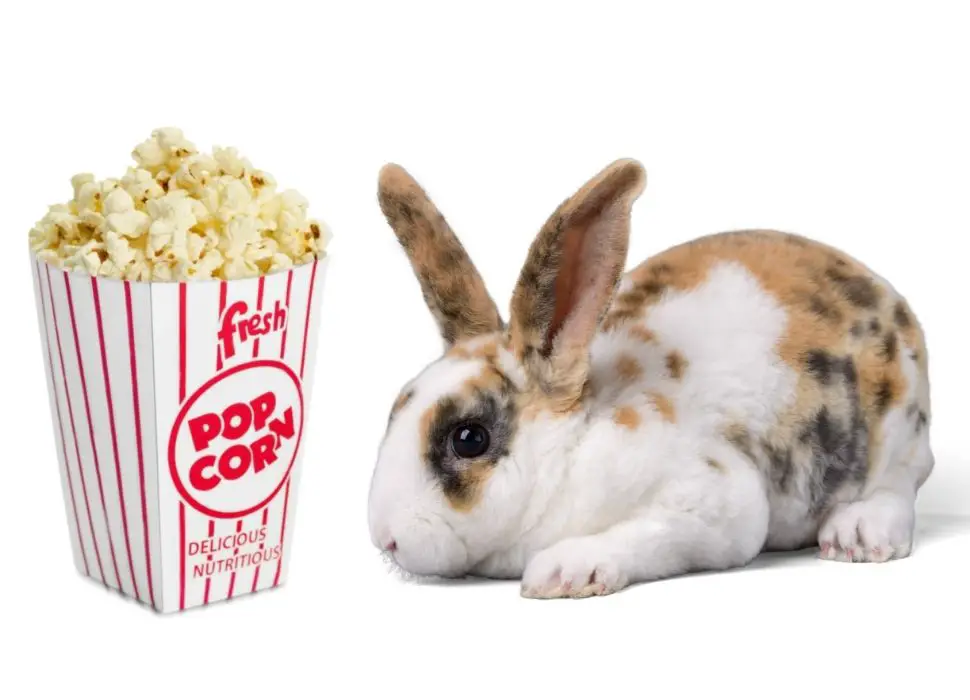Craving a snack? Popcorn may be the perfect treat for you, packed with nutrients and low in calories. But what about your furry friend? Can rabbits eat popcorn too? Discover the answer in our comprehensive guide, where we delve into the surprising health benefits (and potential risks) of feeding your bunny this popular snack. From preparation tips to the right portion sizes, we’ve got all the information you need to know. Can rabbits eat popcorn? Read on to find out!
Popcorn should not be fed to a pet rabbit, popcorn is often popped with cheap unhealthy oils which may upset the balance of a rabbit’s delicate digestive system and the gut flora (bacteria) which aid the rabbit’s digestive process.
So if you’re settling down in front of the TV with Netflix, your bunny, and a share size bag of ‘ sweet and salty then stop right there! We’re here to tell you that NO! Popcorn is not a safe food for a bunny to eat.
We’re not suggesting you call off your evening bonding session, just that you may want to think about picking an alternative treat food for you and your fluffy friend.
Do Rabbits Like Popcorn?
Rabbits really enjoy sweet foods, a little too much in fact. Rabbits are a bit like young children and given the chance would eat sweet foods until they were sick, the problem is that rabbits are physically unable to throw up in the same way that a human child does.

A rabbit has no gag reflex and lacks the stomach muscles needed to be able to bring food back up. As such when their strict high fiber diet is not properly adhered to, rabbits are likely to suffer from gastrointestinal issues such as trapped wind and gut stasis (the digestive system stops working as it should).
Rabbits are herbivores and do not need a varied diet in the same way we do. Although it’s natural to want to give your rabbit a bit of variety it’s important to remember that 80% of a healthy rabbit’s diet should be made up of nutritious high fiber good quality hay and/or grasses like the Timothy Hay like linked below. This is vital to keep their digestive system moving and their teeth at a healthy length.

Vegetables should only make up a very small portion of your bunnies diet, too many vegetables may also affect the rabbit’s gut flora and lead to the dangerous conditions mentioned above.
Why is Popcorn No Good For a Rabbit?
There are two main reasons why popcorn should be avoided as rabbit food.
Firstly, popcorn is made with corn kernels, a favorite of locusts, and with large swarms able to eat 160,000 tonnes of food each day preserving the crop means that corn is usually covered in insecticides, some of these can be very harmful if ingested by a rabbit.
Secondly, popcorn is usually cooked in cheap and unhealthy oils and while our digestive systems can tolerate these, these oils and the additional flavorings/sweeteners can cause all manner of upset to a rabbit’s complex digestive system and the delicate gut flora (bacteria) that reside within it.
Alternative Treats for Rabbits
Aside from vegetables and fruits in moderation, rabbits really should not be eating any human food, a better choice when it comes to treats is small pieces of fruit or vegetable e.g. a small piece of banana, a raisin, a sprig of parsley, or very small piece of carrot.

Alternatively, as a special treat, why not follow our recipe for our delicious and natural ‘banana bliss bites’ linked here?
My Rabbit Has Eaten Some Popcorn, Will It Die?
No, popcorn is not dangerous to rabbits in small doses so if your rabbit has managed to snatch a piece or two, it’s very unlikely that it will suffer any ill effects. However don’t be tempted to feed your bunny more popcorn, a rabbit has a very small stomach and impactions can occur rapidly.
Wrap Up
Despite its good nutritional profile and high fiber, corn is comprised of starchy carbohydrates, too many of which can be very bad for a rabbit.
Carbs are not a normal part of a rabbit’s diet and too many are likely to lead to health issues. Not only will carbs increase the chance of the rabbit becoming obese they can also have a slowing effect on the rabbit’s digestive system and multiple health issues.
We always recommend carefully researching foods before introducing them into your pet’s diet. Quite often, even seemingly safe vegetables or fruits can contain harmful substances or chemicals.
Never take a chance on your little companion’s health with too many treats or sugary snacks and make sure that you first take care of the most important parts of a rabbit’s diet, namely fresh good quality hay, and unlimited fresh water before you think about introducing anything else.
Further Reading
Can rabbits eat popcorn? allpetmagazine.com
Popcorn for bunny binkybunny.com
bunnies and popcorn? rabbitsonline.net
Frequently Asked Questions
Can rabbits eat popcorn?
No, rabbits should not eat popcorn. It’s not part of their natural diet and can lead to digestive issues due to its low fiber and high carbohydrate content.
Is popcorn safe for rabbits to eat?
Popcorn is not safe for rabbits to eat. It lacks the necessary fiber for their diet and can cause digestive problems.
What are the potential risks of feeding popcorn to rabbits?
Feeding popcorn to rabbits can cause digestive problems, obesity, and even choking hazards due to its hard kernels and low fiber content.
How should popcorn be prepared for rabbits if it is safe?
Popcorn should not be fed to rabbits under any circumstances, even if it is plain or popped. It is not part of a safe, healthy diet for rabbits.
Are there any alternative snacks that are healthier and safer for rabbits than popcorn?
Healthier and safer snacks for rabbits include leafy greens, vegetables, and occasional fruits. Always serve in moderation alongside a primary diet of hay.
